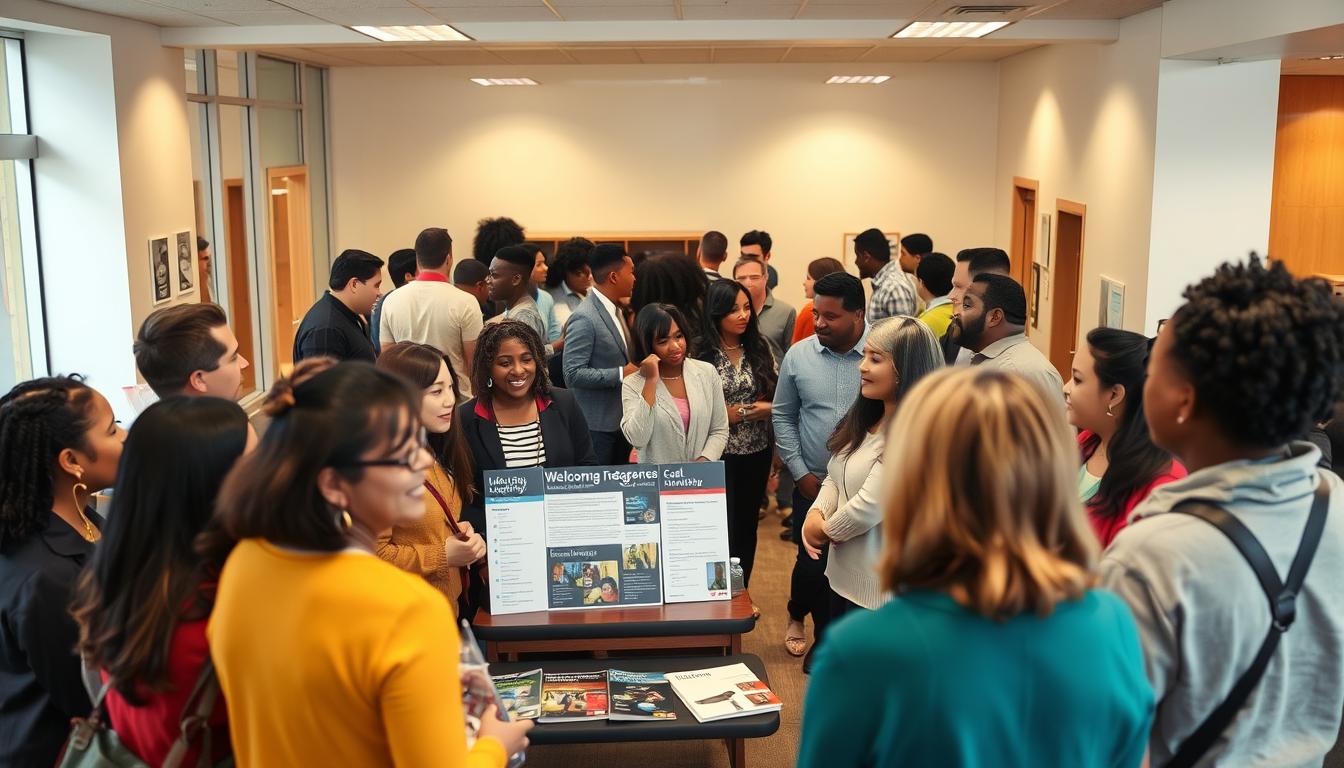Volunteering as a Gateway: Expanding Professional Networks through Active Community Involvement
Anúncios
Volunteering is a key way to grow your professional network and help your community. By joining in on volunteer work, you do more than just help out. You also start a journey of personal and professional growth.
Studies show that volunteering makes you more attractive to employers. This is because it shows you’re committed and willing to help others. When you volunteer, you meet people who share your values and goals. These connections can lead to new job opportunities and valuable professional relationships.
Adding volunteering to your career plan is smart. It helps you achieve both personal satisfaction and career success. It’s a win-win situation that benefits everyone involved.
Understanding Volunteer Engagement
Volunteer engagement is key for both those who help out and the groups they support. It’s about finding, keeping, and motivating volunteers. Good management makes volunteers feel important, which keeps them coming back.
Definition and Importance
Volunteer engagement means nonprofits work hard to get and keep volunteers. It’s not just about the volunteers; it’s also about the success of community projects. When volunteers are engaged, they really connect with the cause, helping it succeed.
Impact on Communities
Good volunteer engagement does more than help one group. It’s a powerful way to tackle big issues like poverty and health. Volunteers help communities grow and face challenges head-on. They also inspire others to give back, leading to lasting change.
The Benefits of Volunteer Work
Volunteering offers many benefits that can improve your life in big ways. It helps you grow personally and professionally. You can learn new skills and develop as a person through volunteering.
Professional Skill Development
Volunteering helps you develop key skills for your career. You can learn about leadership, teamwork, and managing projects. Working with different people improves your communication and adaptability.
Personal Growth and Fulfillment
Volunteering helps you grow by teaching empathy and social awareness. It gives you a sense of purpose and fulfillment. This connection to the community makes life more rewarding.
Broadening Perspectives
Volunteering lets you meet people from different backgrounds. You learn about social issues and cultures. This broadens your view and makes you more open-minded and appreciative of diversity.
How Volunteering Enhances Networking
Volunteering does more than help communities; it’s a great way to network. By joining service projects, you meet people with similar interests. This creates a space where real connections can grow.
These connections often turn into lasting friendships and professional relationships. They can open doors to new opportunities and enrich your life.
Creating Meaningful Connections
Volunteering puts you in touch with others who care about the same things. This shared interest leads to deeper talks and friendships. You build a network of contacts that goes beyond your usual friends.
These connections can lead to new collaborations, mentorship, and friendships. They make your personal and professional life better.
Accessing Diverse Professional Circles
Volunteering lets you enter different professional circles. You meet people from various industries and learn from their experiences. This can open doors to new career paths.
These interactions also broaden your view. You learn to appreciate different perspectives. This helps you grow beyond your usual surroundings.
Types of Volunteer Opportunities
There are many volunteer opportunities out there. They range from short-term projects to long-term commitments. You can even volunteer remotely. Each option has its own benefits and challenges, fitting different needs and schedules.
Short-term Projects
Short-term projects are great for those new to volunteering or with busy lives. They require a short time commitment. You can make a real difference without a long-term commitment.
Many organizations offer these projects. They give volunteers a chance to quickly help out in their community.
Long-term Commitments
Long-term commitments are for those willing to invest more time. They lead to deeper connections and bigger impacts. Volunteers in these roles build strong relationships with the people they help.
This approach lets you understand challenges better. You can make a lasting difference over time.
Remote and Virtual Volunteering
Technology has made remote volunteering possible. It lets you volunteer from anywhere. This is ideal for those with mobility issues or can’t attend in-person.
Remote volunteering connects you to important causes online. It makes volunteering more accessible and effective in today’s world.
Choosing the Right Volunteer Role
Choosing the right volunteer role is key to a fulfilling experience. It’s important to match your interests with the organization’s goals. This way, you’ll be more motivated and committed.
Being passionate about the cause makes you more engaged. You’ll be able to contribute more effectively.
Aligning with Personal Interests
Volunteering in areas you care about can make a big difference. It brings enthusiasm and dedication. You’ll feel a sense of belonging and support.
This connection is good for both volunteers and the organizations they help.
Assessing Time Commitment
Knowing how much time you can give is crucial. You should think about your schedule carefully. This ensures you can meet your commitments without feeling overwhelmed.
By doing this, you’ll have a more positive experience.
Evaluating Skill Matches
Using your skills to help others is rewarding. Think about what you’re good at and how you can use it. This way, you’ll make a bigger impact.
Matching your skills with the organization’s needs is important. It makes your volunteering more effective for everyone.
Best Practices for Engaging Volunteers
Effective volunteer management means creating a positive space for volunteers. It’s about setting clear expectations and valuing each volunteer’s contribution. This approach helps keep volunteers coming back.
Clear Communication and Expectations
Good communication is key in managing volunteers. Volunteers need to know their roles and how they make a difference. This clarity helps them do their best and feel more connected to the cause.
Recognition and Appreciation
Appreciating volunteers is crucial for keeping them involved. Saying thank you and recognizing their hard work builds loyalty. Small gestures can make a big difference in keeping volunteers motivated.
Encouraging Team Collaboration
Building a team spirit among volunteers makes everyone happier and more productive. When volunteers share their ideas, they feel part of something bigger. This leads to better teamwork and more joy in volunteering.
Measuring the Impact of Volunteer Engagement
It’s key for organizations to know how to measure impact to boost volunteer engagement. By doing so, they can see if their programs are working well. They can then make changes to do better in the future. There are many ways to understand what volunteers are doing.
Quantitative Metrics
Quantitative metrics are important for measuring impact. They show how many hours volunteers work and what tasks they finish. This helps organizations see if volunteers are sticking around and how far their efforts reach.
Qualitative Assessments
Qualitative assessments give a deeper look at volunteer engagement. By listening to volunteers, organizations can learn more about their experiences and reasons for helping. Also, hearing from those helped shows the real difference volunteers make. This way, organizations can make their programs even better.
Volunteer Engagement in Different Sectors
Volunteer work is key in many areas. Each field uses its own ways to get people involved and responsible. Knowing how these sectors use volunteers shows the wide range of ways to help out.
Nonprofit Organizations
Nonprofits depend on volunteers to reach their goals. They offer many chances for people to use their skills and time. This helps both the volunteers and the communities they help, making a big difference.
Corporate Social Responsibility Initiatives
More companies are adding social responsibility to their work. This lets employees help out, building teamwork and improving the company’s image. Helping out through CSR can also make work more enjoyable and tackle big problems.
Community-Based Programs
Community programs tackle local issues, using volunteers to make a difference. These programs let people directly help their neighborhoods. By joining these efforts, volunteers can build strong bonds and help their communities grow.
Leveraging Volunteer Experience on a Resume
Volunteer work can greatly improve your resume. Employers now look for community involvement. It’s key to show off the skills you’ve learned from volunteering.
By highlighting your volunteer work, you tell a story of initiative, leadership, and dedication. This can make your resume stand out.
Highlighting Skills Gained
It’s important to focus on skills you’ve developed through volunteering. Skills like teamwork, project management, and communication are often honed through volunteer work. Each role offers a chance for personal and professional growth.
By pointing out these skills, you show you can make a positive impact at a new job.
Presenting Volunteer Work Effectively
To showcase volunteer work well, you need to put it in context. Explain the tasks you handled and how they relate to the job you want. Mentioning specific achievements, like the number of people helped or money raised, adds value.
This approach not only highlights your experience but also ties it to your career goals.
Challenges in Volunteer Engagement
Engaging volunteers comes with its own set of challenges. Time constraints and keeping volunteers motivated are two big hurdles. These factors can make it hard to keep volunteers involved for the long haul.
Time Constraints
Many people struggle to find time to volunteer because of their busy lives. Work, family, and personal commitments often take priority. To overcome this, organizations need to make volunteering easy and flexible, fitting into people’s schedules.
Maintaining Volunteer Motivation
Keeping volunteers motivated is key to keeping them around. Organizations should aim to make volunteering rewarding and meaningful. By doing so, they can encourage volunteers to stay and contribute more.
Case Studies: Successful Volunteer Programs
Looking at successful volunteer programs shows us what works well. They share effective ways and new ideas used by different groups. These examples help others improve volunteer work and make a real difference.
Notable Organizations Leading the Way
Habitat for Humanity and Points of Light are leading the way. Habitat for Humanity gets volunteers to build homes, helping with housing and community growth. Points of Light helps people find volunteer jobs that match their skills and interests.
Both groups focus on training and supporting their volunteers. This makes the volunteer experience better.
Unique Initiatives with High Impact
Some volunteer projects stand out because of their results. Community gardens give fresh food and bring people together. Youth mentorship programs help young people grow and succeed.
These projects show how creative volunteer work can help a lot. They build a sense of community and action.
Future Trends in Volunteer Engagement
Technology is changing how we volunteer, making it easier to find and join causes. Sites like VolunteerMatch and GivePulse help match people with projects. This makes volunteering more accessible and fulfilling, as it’s tailored to your interests and schedule.
Volunteer flexibility is also becoming key. With busier lives, people want to volunteer on their own terms. Organizations are now offering flexible volunteer options. This way, more people can help out, making a bigger difference in our communities.
For organizations to keep volunteers engaged, they need to keep up with these trends. Using technology and offering flexible volunteer options can make a big difference. This way, more people can contribute their time and skills to important causes.
FAQ
What is volunteer engagement?
How does volunteering benefit professional development?
What types of volunteer opportunities are available?
How can organizations improve volunteer retention?
What challenges do volunteers often face?
How can one choose the right volunteer role?
How can technology enhance volunteer recruitment?
Why is community involvement important for volunteers?
Published on: 28 de March de 2025

Luke Martin
Luke Martin, author of Credwallets.com, is a mathematics graduate with a specialization in financial markets. Known for his love of pets and his passion for sharing knowledge, Luke created the site to provide valuable insights into the complexities of the financial world. His approachable style and dedication to helping others make informed financial decisions make his work accessible to all, whether they're new to finance or seasoned investors.







